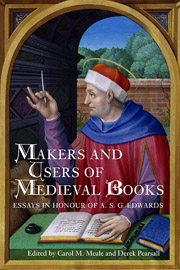Book contents
- Frontmatter
- Contents
- List of Illustrations
- Contributors
- Preface
- List of Abbreviations
- COMPOSITION
- COMPILATION
- PRODUCTION
- OWNERS, PATRONS, READERS
- AFTERLIVES
- Love in the 1530s
- Editorial Glossing and Reader Resistance in a Copy of Robert Crowley's Piers Plowman
- Beaupré Bell and the Editing of Chaucer in the Eighteenth Century
- A. S. G. Edwards: List of Publications
- Index of Manuscripts and Early Printed Books
- General Index
- Tabula Gratulatoria
Editorial Glossing and Reader Resistance in a Copy of Robert Crowley's Piers Plowman
from AFTERLIVES
Published online by Cambridge University Press: 05 May 2014
- Frontmatter
- Contents
- List of Illustrations
- Contributors
- Preface
- List of Abbreviations
- COMPOSITION
- COMPILATION
- PRODUCTION
- OWNERS, PATRONS, READERS
- AFTERLIVES
- Love in the 1530s
- Editorial Glossing and Reader Resistance in a Copy of Robert Crowley's Piers Plowman
- Beaupré Bell and the Editing of Chaucer in the Eighteenth Century
- A. S. G. Edwards: List of Publications
- Index of Manuscripts and Early Printed Books
- General Index
- Tabula Gratulatoria
Summary
Robert Crowley's editing of Piers Plowman was long considered as an instance of Reformist appropriation of a pre-Reformation text. The case was influentially made by John N. King, who argued that Crowley's interpretation of Langland's work ‘marks the culmination of the Piers Plowman apocrypha that had grown up during the previous two centuries’, and that had transformed the medieval ploughman figure from Langland's complex symbol into a stock spokesperson for religious reform. However, recent scholarship has modified this understanding of Crowley's work. Building on the findings of critics including Mike Rodman Jones, Larry Scanlon and Rebecca Schoff, this article will re-examine the paratexts of Crowley's first and second editions of Piers Plowman (1550). It will argue that the scope for differing interpretations arises from the experimental quality of Crowley's glossing, as he tests its potential both to establish Langland as part of the developing vernacular literary canon, and to encourage his readers actively to reflect on and engage with the text. Central to both aims is his insistence that Langland's work should not be read as prophecy, yet at least one early reader strenuously resists Crowley's guidance on this point; the numerous annotations in this reader's copy of Crowley's second edition – now British Library, C.122.d.9 – insist that the poem is prophetic of the Reformation. This difference of opinion not only reveals two distinct ways of reading Piers Plowman, but also indicates something about the way in which the annotator thought about the relationship between Langland's text and Crowley's glosses, and thus about the status of a printed text.
- Type
- Chapter
- Information
- Makers and Users of Medieval BooksEssays in Honour of A.S.G. Edwards, pp. 202 - 213Publisher: Boydell & BrewerPrint publication year: 2014



